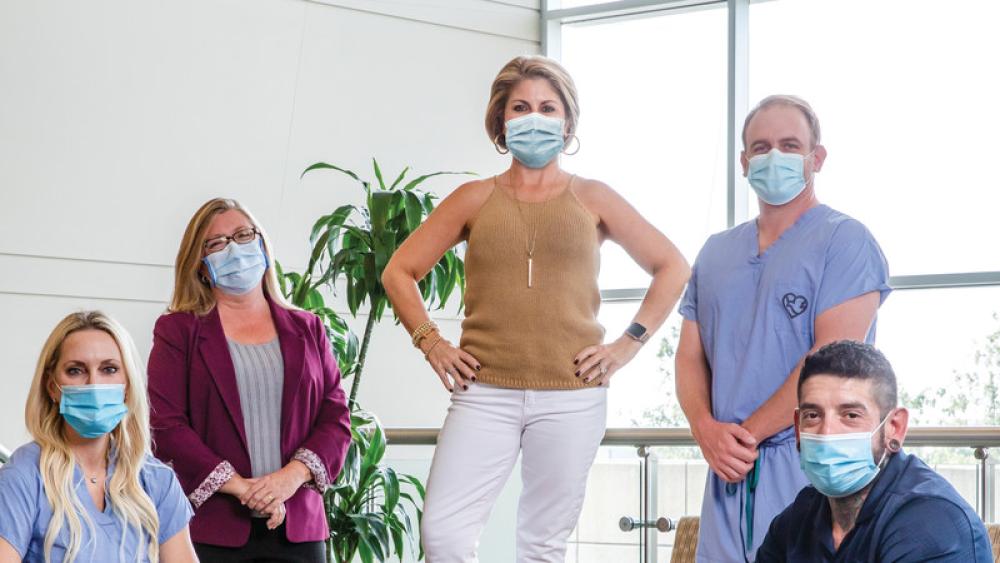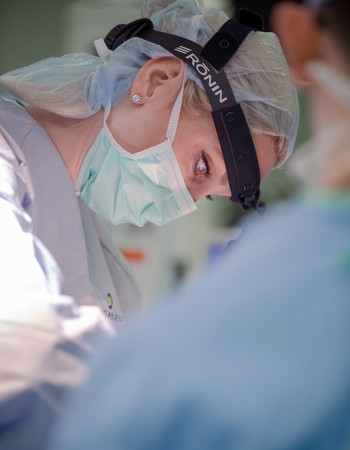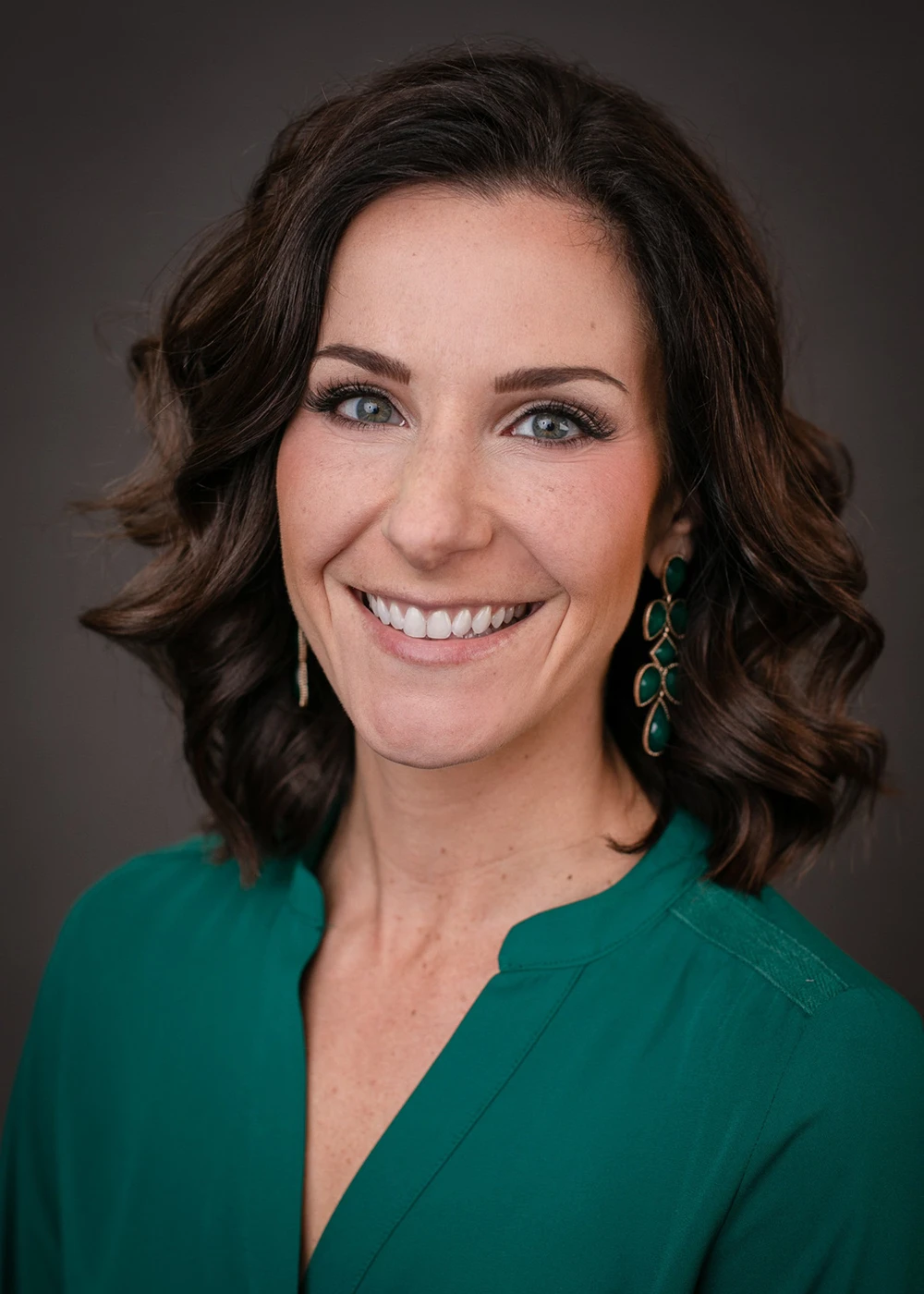





The Meaning of Care Magazine
‘Glad It Happened Here’: Cancer Survivor Leans On Her Faith and Physicians To Become Better – Not Bitter
Published: Dec. 6, 2021

As she removed her bandages and looked down at her chest, Susan Lumsden “lost it.” After such a hard-fought battle, she was convinced she had nothing to show for it.
“To see your nipples just … gone,” Susan said as she tried to hold back tears. “To see yourself as almost this blank canvas – that was hard. On top of my whole world crashing down, I no longer felt like myself.”
But she had a choice, she thought: “I could either be bitter, or I could be better. And I have to say, my cancer has made me a better person mentally, spiritually and physically.”
For that, she has her faith and physicians to thank.
A Monumental Move

Susan, 51, remembers when her life was “perfect.”
“I never experienced a tragedy. Never dealt with a crazy crisis. I’ve always been healthy. I have a wonderful husband and an amazing son. I had a great life.”
And thanks to her husband’s career, that life was spent in a lot of “really cool places up and down both coasts.”
In 2016, his career presented another move.
“He said, ‘What do you think about Omaha?’ I was like, ‘Nebraska?! OK, sure, why not?’” Susan said with a laugh.
After settling down in Elkhorn, she established primary care at Methodist Physicians Clinic Women’s Center, next to Methodist Women’s Hospital.
Even though she only saw her Methodist OB/GYN,
Rebecca Jacobi, MD, about once a year for well-woman exams, Susan quickly felt a connection to her and the entire health system.
“Everyone is so kind,” she said. “It’s always just such a lovely experience.”
But a routine mammogram in February 2020 resulted in less-than-lovely news.
Faithful and Fearless
“They called to tell me that I had some calcifications in my left breast,” Susan said. “I thought maybe I had a cyst or something – just kind of oblivious to what this could mean.”
A biopsy revealed cancer.
But a breast MRI revealed something worse: A lumpectomy – or the surgical removal of cancerous breast tissue – wouldn’t be enough to treat it. Methodist general surgeon Benjamin Grams, MD, had the difficult job of calling Susan with the news: She needed a mastectomy.
“It was a pretty intense moment,” Susan said. “Here I had this perfect life. Everything was great. And with the flip of a switch, it wasn’t.”
Although Susan tested negative for BRCA gene mutations and didn’t need a risk-reducing double mastectomy, she told Dr. Grams she wanted one anyway. He recruited Methodist reconstructive surgeon Kathryn Honz, MD, who was already familiar with Susan’s case thanks to Methodist’s weekly breast tumor conference. It’s a collaborative meeting that brings together highly-trained specialists to discuss the most individualized treatment plan for every Methodist breast patient.
“It’s a team,” Dr. Honz said. “And it’s essentially where the best cancer treatment starts.”
Susan’s treatment would start with Dr. Grams and Methodist general surgeon Paul Kolkman, MD, simultaneously performing the double mastectomy just prior to Dr. Honz performing implant reconstruction. Susan was at peace with it all.
“I knew that God had put these doctors in my path for a reason,” she said. “These talented, compassionate individuals were mine. And I felt so safe and confident in their abilities.”
On the morning of April 9, 2020, COVID-19 visitor restrictions forced Susan to walk into Methodist Hospital alone, without the comforting presence of her husband. One of the scariest moments of her life quickly turned into one of the bravest.
“I’ll never forget it,” she said. “I was in the preoperative area. In walk Dr. Honz and Dr. Grams. They looked at me. I looked at them. And I said, ‘Let’s get this party started.’”
While the two surgeons initially believed that Susan was a candidate for nipple-sparing reconstruction, further testing revealed that the margins of her cancer were too close to the skin. Not only would Susan lose her nipples, but she would also need chemotherapy and radiation – which were coordinated by her oncologist, Kirsten Leu, MD, with Nebraska Cancer Specialists.
“Every step of the way, we found that her cancer was a little more involved than we had hoped,” Dr. Grams said. “But the thing about Susan? She’s quite possibly the most positive person I’ve ever met. She’s so strong in her faith. She’s fearless. She can tackle anything.”
Imperfectly Better

In March, Dr. Honz performed a fat grafting procedure on top of Susan’s implants to make her breasts look fuller and more uniform, and she eventually referred Susan to a local tattoo artist.
“I was intrigued with the idea of having nipples again,” Susan said.
After her final tattoo session in May, she was no longer a “blank canvas.”
“I was beautiful,” Susan said. “I was whole. I felt like Humpty Dumpty – I was put back together again.”
“I want women to know that it’s OK to care about their breasts – to want to feel like a woman and care how they look,” Dr. Honz said. “Cancer shouldn’t take that away from them. Breast reconstruction isn’t a cosmetic procedure, it’s a return to normal.”
And Susan’s return happened right where it was supposed to.
“I’ve lived in a lot of great places, but I’m glad it happened here,” she said of her entire cancer journey. “Because you just don’t get this kind of care anywhere else.”
And while her life’s story is no longer picture perfect, she now truly believes it’s better than ever.
“God’s always had a purpose for me, but now, he’s given me a voice. Where you go for care matters. Your doctors matter. Because of them, I worked out this morning. I’m going to lunch with a girlfriend today. I get to continue loving my husband. I get to see my son graduate. I get to live for today. I’m good! And I can’t explain how thankful I am.”
More Resources
- Read more from the winter 2021 issue of The Meaning of Care Magazine.
- Learn more about surgery at Methodist.
- Learn more about plastic and reconstructive surgery at Methodist.
- Learn more about breast cancer care at Methodist.


